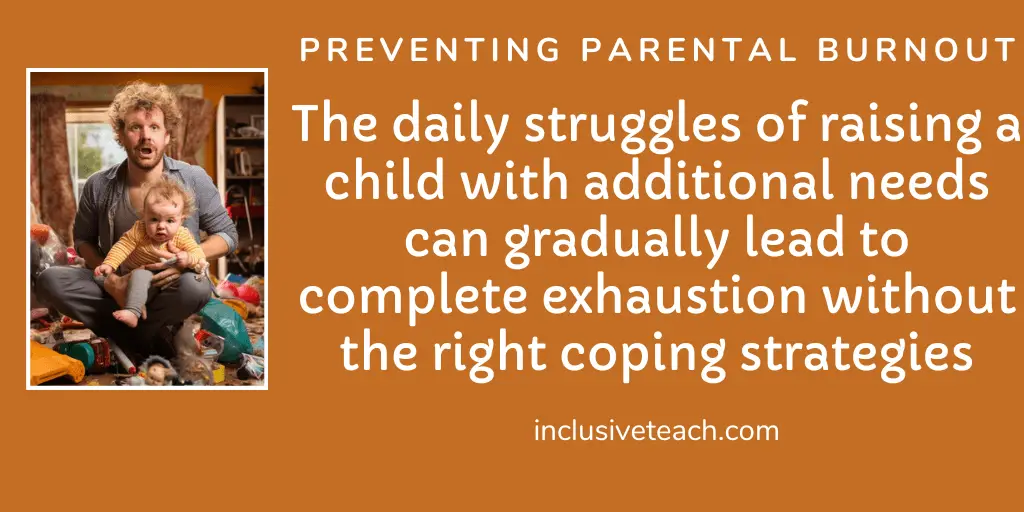How to Prevent Parental Burnout
How to Care for Yourself While Caring for Your SEN Child: Preventing Parental Burnout
Parental burnout is reaching alarming levels among parents of children with SEN in the UK. With cuts to services, rising mortgage rates and inflation, families are under more pressure than ever. The daily struggles of raising a child with additional needs can gradually lead to complete exhaustion without the right coping strategies. Implementing self-care and lifestyle changes is crucial for maintaining resilience. This article will provide parents with actionable techniques to recognise, relieve, and hopefully prevent parental burnout.
Recognising the Warning Signs of Burnout
Stress is a natural part of life and can be motivating. However If stress occurs for too long or in high amounts, it can lead to burnout. The first step is tuning into the early warning signs of burnout, these include:
- Constant exhaustion despite adequate sleep
- Lack of patience, irritability, frequently snapping at loved ones
- Inability to concentrate or focus
- Physical manifestations like headaches, stomach issues, muscle tension
- Feeling disinterested and apathetic about activities you used to enjoy
- Weakened immune system leading to frequent illnesses
- Just sitting scrolling through your phone as it’s the easiest thing to do.
Ignoring these signals leads down an unhealthy path. Catching escalating stress early and taking steps to press pause is essential for parents of SEN children.

Self-Care Techniques for Stress Relief
When you recognise your stress level creeping upwards towards burnout, take action by:
- Taking Time Out for Yourself: Carve out small pockets in your schedule for self-care activities like reading, meeting a friend for coffee, going for a walk. Prioritise time for yourself every day.
- Reframing Unhelpful Thoughts: Notice negative thought patterns and consciously reframe them. Exchange “I can’t do this” with “I will get through this.”
- Seeking Out Support Groups: Join an in-person or online parent support group. Share your experiences and gain insight from others with similar challenges. Groups like SNAAP in Kent are great for making these connections.
- Scheduling Regular Time to focus on your relationship: Protect time alone with your partner. Even just staying in after the kids go to bed to maintain a connection.
- Trying Relaxation Techniques: Practice deep breathing, visualisation, meditation, or mindfulness apps to calm the nervous system.
- Exercising: Exercise releases feel-good endorphins while alleviating pent-up stress. Take a brisk walk, join a gym (nope!), do some light gardening.
- Saying No: Don’t overcommit. Only take on what you can reasonably manage after carving out me-time. This can be work or home.
- Letting Go of Unrealistic Expectations: Accept that some days, just covering the basics like feeding the kids is enough of an accomplishment “Good enough”.
Building Lifestyle Habits to Prevent Burnout
In addition to short-term relief techniques, consider longer-term lifestyle habits:
- Setting Work/Life Boundaries: Set firm boundaries around work and leisure time. Disconnect from email in the evenings and weekends.
- Prioritising Sleep: Lack of sleep exacerbates stress immensely. Make 8 hours per night a priority for the whole family.
- Eating a Nutritious Diet: Eat regular balanced meals high in mood-boosting foods. Limit caffeine and sugar highs and crashes.
- Building a Support Network: Develop a network of family, friends, professionals, and other parents of autistic children. Don’t isolate yourself.
- Finding an Expressive Outlet: Explore hobbies like journaling, art therapy or music lessons as a cathartic outlet.
- Taking control of other areas of your life: Especially if you are parenting and separated.
- Considering Supplements: Explore supplements like magnesium, vitamin B and fish oil to counteract chronic stress.
- Collaborating with Your Child’s School or Nursery: Work with staff to optimise their training on autism support strategies and co-production
- Making Time for Family Fun: Plan regular family activities focused on laughter and enjoyment. Uplifts the whole family.
How to Prevent Parent Burnout: Conclusion
Without concerted effort, burnout is inevitable for parents raising one or more children with SEN. We are all facing rising challenges. Implementing healthy coping strategies and lifestyle changes makes all the difference in fostering resilience. Supporting your own mental and physical wellbeing is just as crucial as caring for your autistic child. Use the tips in this article to recognise escalating stress, relieve it in the moment, and establish long-term habits to sustain your capacity to parent happily.







